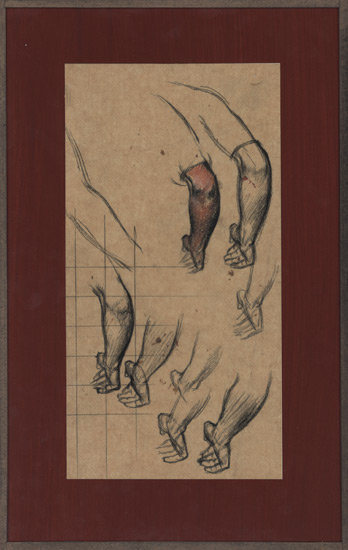 £510
£510
Charles Mahoney:
Study of a lower arm for Morley College Mural, 1928
Passe-partout (ref: 4870)
Charcoal and coloured chalk on paper, 10 1/2 x 5 1/2 in. (27 x 14 cm).
14 1/4 x 9 in. (36 x 23 cm. framed).
Tags: Charles Mahoney chalk charcoal study Murals ex catalogue Works in Progress
Provenance: The Artist's Studio
The scheme to decorate Morley College was funded by Lord Duveen and followed on from his commission for Rex Whistler to decorate the Refreshment Room of the Tate Gallery (at a cost of £ 1,200). Six painters, all former students at the RCA, were invited to submit designs. Those chosen were Mahoney, Bawden and Ravilious. Mahoney's contribution, The pleasures of Life, was the central feature on the wall at the back of the stage used for orchestral concerts, dramatic performances and folk dancing.
In the foreground were seven Muses: (left to right) Dancing, Plastic Art, Music, Philosophy, Drama, Poetry and Prose. Country Dances, Outdoor Pastimes and Apple Picking were presented in the spaces above.
The scheme was completed in situ during an 18 months period and was worked in oil paint mixed with wax, on canvas, fixed to the wall. The building was destroyed by a bomb during the Second World War and none of the work of the three artists survived.
For drawing, Mahoney liked a textured paper, soft to the touch, such as Ingres, or still better, hand-made papers from
firms such as Hayle Mill or Barcham Green. Occasionally he bought cheap sketchbooks from Woolworth’s because
he found the paper so sympathetic as a surface for drawing. For his earliest drawings he used mainly B or 2B
pencils, but he later preferred Black Prince or carbon pencils. He often used charcoal, adding white or red crayons to
highlight drawings. Sometimes he combined these with conté crayons or pastels. For his later drawings he preferred
pen and wash, taking great trouble to mix and dilute his inks until he achieved the required tone and colour. His
drawing pens were either reservoir nibs in holders or else cartridge pens.















